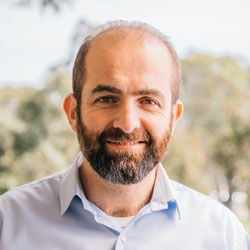

Prof Salah Sukkarieh
TRANSFORMING LIVES AND LIVELIHOODS:
The Digital Revolution in Agriculture
7-8 August 2017, Canberra

| Conference Home Topic Overview Sir John Crawford Address Conference Program Speakers and Chairs Keynote Listeners Conference Scholars Conference & Scholar Sponsors Conference Media Registration Fees |
Prof Salah Sukkarieh
Professor Salah Sukkarieh Paper Crawford Fund Conference 2017 Professor Salah Sukkarieh Presentation Mobile On-Farm Digital Technology for Smallholder FarmersAbstract For over 10 years the Australian Centre for Field Robotics (ACFR) at the University of Sydney has been developing novel mechatronic and software systems for the Australian agriculture industry. The aim is to support farmers with the research, development and commercialisation of digital tools that would help them increase yield and productivity and reduce input costs. In 2015 the ACFR received philanthropic funding to look at designing similar technology for smallholder farmers. The hypothesis is that with an appropriate education and training program coupled with low-cost on-farm mobile platforms and digital tools adapted from more precise technology, a system and methodology could be developed that delivers food and nutrition security as well as encourages next-generation growers to adopt digital agriculture techniques. These requirements led to the development of the Digital Farmhand. The Digital Farmhand comprises of a small mobile platform that can be hand towed, remotely controlled, or set into autonomous mode. On the mobile platform exists a smartphone, sensors, and computing. Collectively the system can undertake precision seeding, spraying and weeding. Through the digital capability of monitoring and analysing individual plants the system has the potential to support better on-farm decision making, helping growers increase yield and productivity, reduce input costs, and maximise nutrition security. The Digital Farmhand has been trialled amongst small farm holders in Australia as well as in Indonesia and will be trialled later this year in the Pacific Islands. The objective of these trials is to close in on the requirements that would meet the needs of those communities. |
 Salah Sukkarieh is the Professor of Robotics and Intelligent Systems at the University of Sydney and is an international expert in the research, development and commercialisation of field robotic systems. Over the last 10 years he has been developing robotic and digital technologies for agriculture focusing on how technology can be used to enhance sustainability and quality of life for growers. Salah has secured a number of large-scale R&D projects from the horticulture, grains and grazing livestock industries and has demonstrated operational systems around Australia. He was selected as one of 11 LAUNCH Food Innovators from 280 worldwide applications for his research and technology in 2017, and was recognized as one of Australia’s Most Innovative Engineers by Engineers Australia in 2016. Salah is a Fellow of the Australian Academy of Technology and Engineering.
Salah Sukkarieh is the Professor of Robotics and Intelligent Systems at the University of Sydney and is an international expert in the research, development and commercialisation of field robotic systems. Over the last 10 years he has been developing robotic and digital technologies for agriculture focusing on how technology can be used to enhance sustainability and quality of life for growers. Salah has secured a number of large-scale R&D projects from the horticulture, grains and grazing livestock industries and has demonstrated operational systems around Australia. He was selected as one of 11 LAUNCH Food Innovators from 280 worldwide applications for his research and technology in 2017, and was recognized as one of Australia’s Most Innovative Engineers by Engineers Australia in 2016. Salah is a Fellow of the Australian Academy of Technology and Engineering.